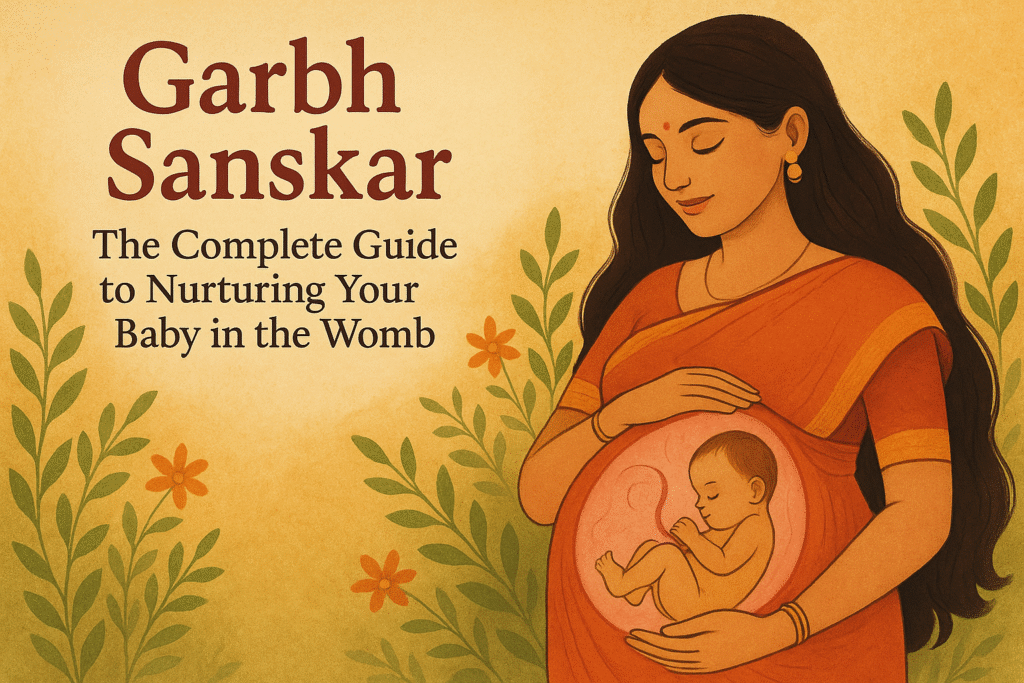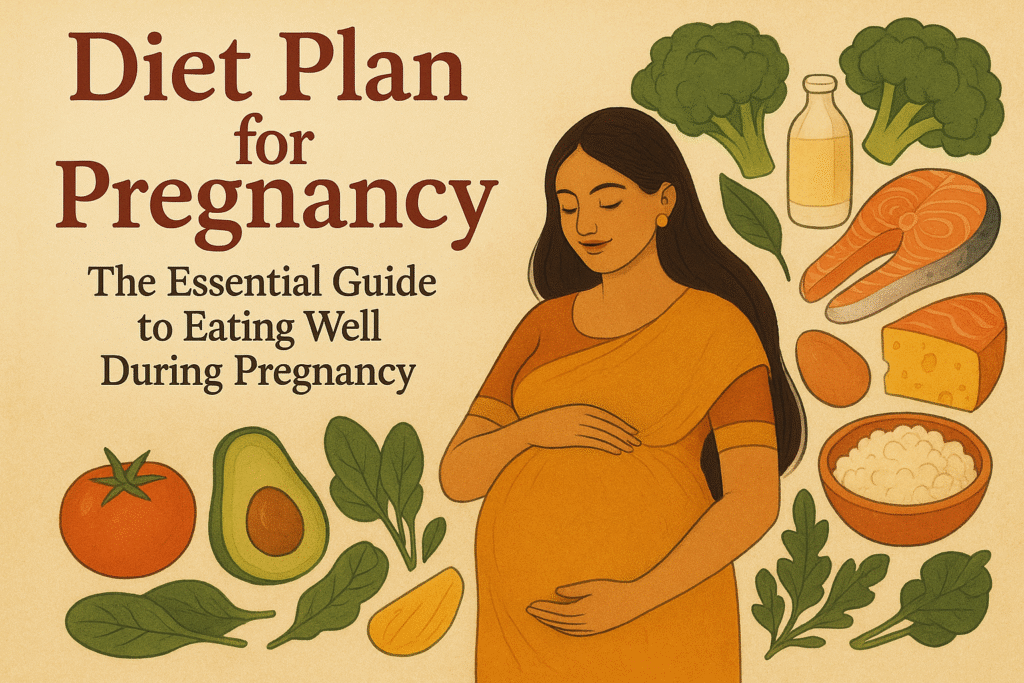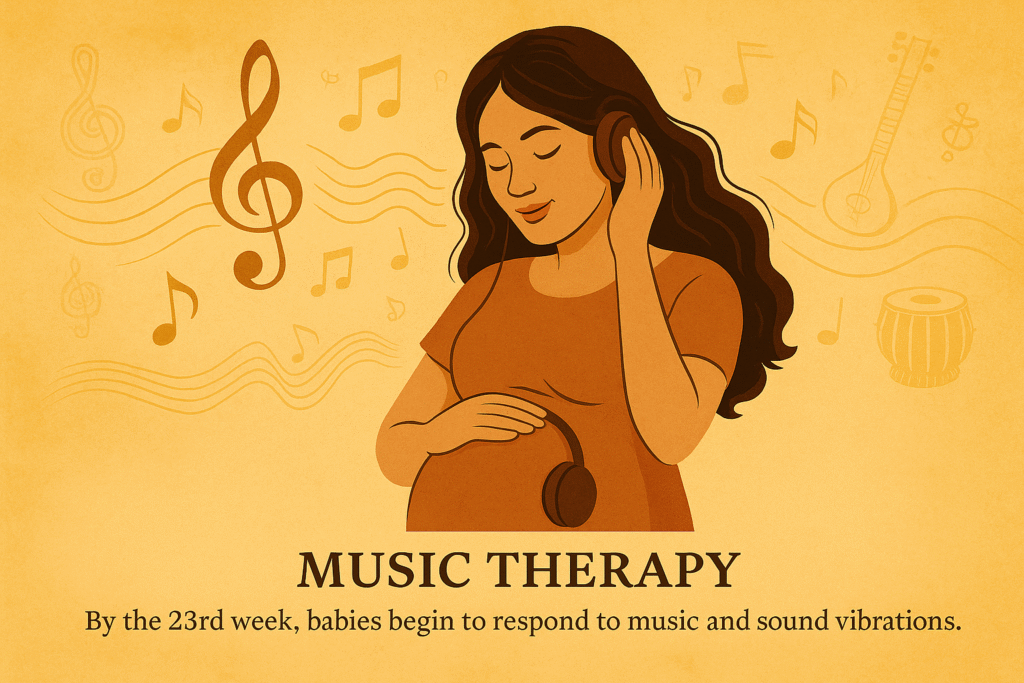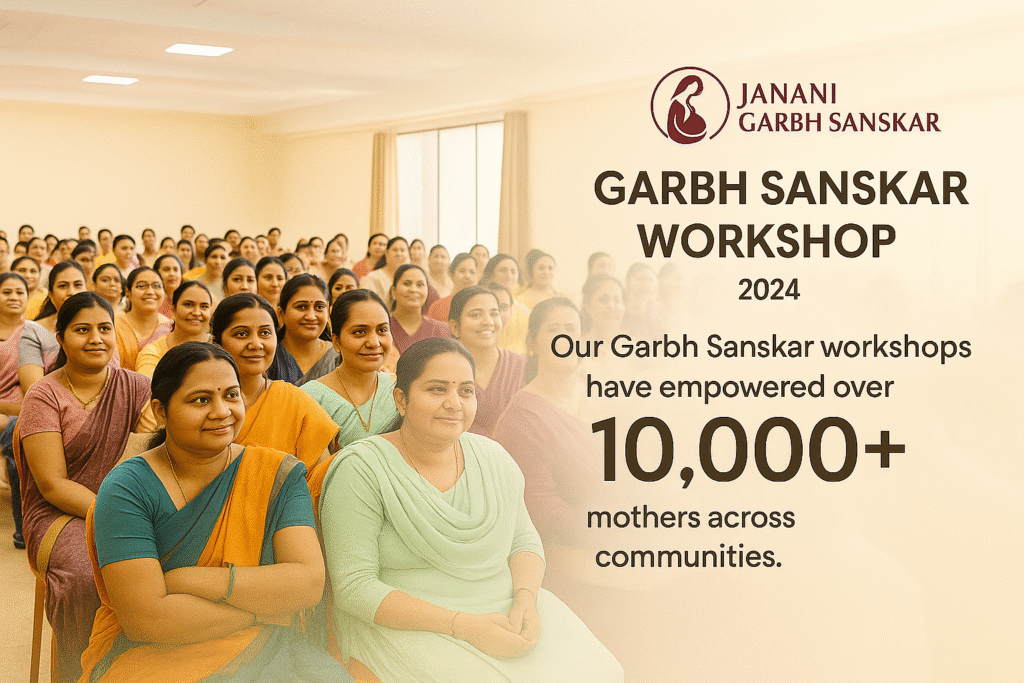
Introduction
Garbh Sanskar is a holistic prenatal practice rooted in ancient Ayurvedic wisdom. It supports the mental, physical, emotional, and spiritual development of a baby while in the womb. At Janani Garbh Sanskar, established in 2013 in Solapur, we have guided over 50000+ mothers through structured programs that include music therapy, mantras, meditation, Ayurvedic diet planning, and more. Our efforts extend beyond individual care through community seminars, events, and government hospital partnerships.
Why Garbh Sanskar Matters
Garbh Sanskar translates to “education in the womb.” Both traditional texts and modern science agree that a baby’s emotional and mental foundation begins forming during pregnancy. A mother’s thoughts, actions, emotions, and environment significantly influence fetal development.
Scientific studies now confirm that the prenatal environment impacts long-term cognitive growth, emotional health, and behavioral tendencies. Just as the body requires nutrients, the unborn child’s brain and soul respond to emotional nourishment like love, sound, peace, and positivity.
Core Objectives of Garbh Sanskar:
- Purify body and soul
- Enhance brain development
- Minimize negative traits and increase desirable qualities
- Promote emotional well-being and maternal balance
- Ensure a smoother, safer, and more natural delivery

These objectives align with Ayurvedic month-wise pregnancy care known as Masanumasik Paricharya, which tailors care practices to each month of fetal development.
Garbh Sanskar Elements Practiced at Janani Garbh Sanskar

- Ayurvedic Diet Guidance
Each trimester is supported by a trimester-specific Ayurvedic nutrition plan based on the baby’s developmental milestones and the mother’s physical condition. Balanced intake of sattvic foods, herbs, ghee, fruits, and lentils ensures nourishment and vitality. - Music Therapy
By the 23rd week of pregnancy, the baby can hear external sounds. Our programs incorporate raga-based music (like Bhairavi, Malkauns, and Yaman) to soothe the baby and calm the mother. Music also promotes fetal sensory development and emotional bonding.
👉 Read: How Music, Mantras & Meditation Shape the Baby’s Mind in the Womb - Mantra Chanting
Chanting sacred mantras like Om, Gayatri Mantra, Mahamrityunjaya Mantra, and specialized Garbh Raksha mantras generates healing frequencies that pass through the mother’s body to the fetus. These positive vibrations influence early brain development, promote emotional calmness, and aid spiritual bonding. - Meditation
Meditation encourages the mother to connect deeply with the child. It includes visualization of the baby, gratitude affirmations, and breath awareness. These practices reduce stress, regulate hormones, and enhance mental peace for both mother and baby. - Yoga for Pregnancy
Yoga helps maintain flexibility, improve posture, and strengthen pelvic muscles. Personalized yoga practices are provided depending on trimester and physical condition. Techniques include gentle asanas, pranayama, and guided relaxation. - Basti Treatment
In the 9th month, Basti (an Ayurvedic procedure using medicated oil) is performed to strengthen the pelvic muscles, improve elasticity, and ease labor pains. This treatment has been highly effective in promoting “Sukh Prasuti” or painless delivery.

Community Outreach and Impact
Janani Garbh Sanskar has a proud legacy of contributing to public health through its partnerships and free initiatives:
- Over 50 plus major free Garbh Sanskar Shibirs and awareness events
- Annual collaboration with Lokmat media group and Bhaskar group in Solapur
- 20+ events hosted at rural hospitals
- 50+ Suvarnaprashan camps conducted for low birth weight babies at Anganwadis
- Over 10000 ANC mothers directly benefited from workshops and one-on-one sessions
Our goal is to promote conscious pregnancy in every household—urban or rural.
Month-Wise Garbh Sanskar Schedule (Masanumasik Paricharya)
Ayurveda suggests different care approaches for each month of pregnancy. We follow this structure closely:
- 1st–3rd month: Mindful diet, spiritual affirmation, grounding music
- 4th–6th month: Yoga introduction, deeper mantra practice, positive reading
- 7th–9th month: Emotional preparation, meditation with baby bonding, Basti treatment
This structured progression ensures alignment with the baby’s physical and psychological growth.
Recommended Reading and Blog Topics
To dive deeper into Garbh Sanskar practices, explore these informative articles:

- How Music, Mantras & Meditation Shape the Baby’s Mind in the Womb
- What is Panchakarma? Benefits of Ayurvedic Detox
- Spiritual Science Behind Garbh Sanskar for Modern Parents
- From Fertility to Postpartum: The Ayurvedic Journey
- 10 Daily Practices for a Healthy Pregnancy
- Why Garbh Sanskar Classes are Gaining Popularity in Solapur
- How Garbh Sanskar Affects Baby’s Brain – Backed by Science
All blogs will be interlinked on our workshop.jananigarbhsanskar.com
site as the knowledge base grows.
Conclusion
Garbh Sanskar is a conscious and sacred approach to motherhood. It helps to create a womb environment filled with love, positivity, and spiritual strength. By following Ayurvedic traditions and proven prenatal practices, mothers can nurture their child’s future with care and intention.

At Janani Garbh Sanskar, we offer the perfect blend of ancient wisdom and modern tools to guide mothers through this life-changing journey. Whether you’re a first-time mother or already parenting, these practices support both you and your baby in body, mind, and soul.
👉 Learn more at https://workshop.jananigarbhsanskar.com
Pingback: How Music, Mantras & Meditation Shape the Baby’s Mind in the Womb - Janani Garbhsanskar How Music, Mantras & Meditation Shape the Baby’s Mind